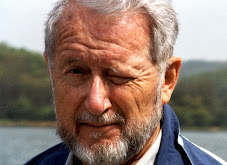Essay 27
MY CONVERSATION WITH SERGEI KHRUSHCHEV
When Stalin died in 1953, Bulganin was chosen to head up the government but it was clear even to young guys in Los Alamos that the Soviets were a mystery, and no one could predict anything. We believed that the contest between our two nations was vital but did not yet realize just how traumatic it would all become. The Soviet’s first nuclear test was an eye opener, for it came much sooner than most people expected.
When Nikita Khrushchev took over there was lots of speculation that a full-blooded peasant might do incredibly impulsive things. There was concern everywhere.
One of the outstanding events that emerged as truth was that Laventry Beria was no longer the head of the MVD (The MVD became the KGB after Beria’s death). Just how did that happen?
As the story goes, Khrushchev and the others realized with perhaps only a few days to go that Beria planned to kill them all and, being a megalomaniac and in complete control of the Soviets’ nuclear stockpile, might be tempted to do all he could to rule the world.
The Russians’ official story is that in a meeting in the Kremlin, with Beria completely in charge of security, each member of the politburo was strip-searched three times before they assembled. Then, they placed Beria under arrest, tried him and found him guilty, and subsequently had him executed in a Kremlin courtyard.
There seemed to be some credibility in the beliefs of some that in truth, Khrushchev and the others first killed Beria with their bare hands, as that was all that was available, and then the guards changed sides. Whatever the facts are, it must have been a truly amazing moment in world history.
When the Atomic Museum in Las Vegas was getting under way, Sergei Khrushchev, Nikita’s son, was invited to participate in the dedication ceremony. His lecture was on the Cuban crisis, and an interesting one it was, too. I waited for the opportunity to meet him, introduced myself as an ex-Los Alamos person, thanked him for his lecture, and then asked him the following question.
“What can you tell me about the relationship of your father and Mr. Beria? I am quite curious about it.”
Mr. Khrushchev did not answer immediately, not understanding my pronunciation of “Beria”. But after some moments of reflection, his answer was mostly like this. Well, Beria and my father were never near each other very much during the war, for my father spent most of his time away from Moscow, though they did meet in Georgia. Ultimately they were together for a long time, and—well, you see—my father—at one time—it is difficult—Beria—my father—“well, it was either one or the other!”
Those last eight words are a quote. I’m quite certain Mr. Khrushchev spoke the truth!
A couple of weeks passed, and one day my phone rang. I had a great difficulty in making out who the caller was, as there was an accent. And a heavy one! The accent was definitely Russian.
“Is this Mr. Khrushchev?” I asked. It was, and we had a delightful discussion.
I’ve been asked “why did Mr. Khrushchev call you?”
Well, Mr. Khrushchev is now a capitalist. And he wanted money. Isn’t that simple?
He wanted speaking engagements.
Monday, September 29, 2008
Subscribe to:
Post Comments (Atom)


No comments:
Post a Comment